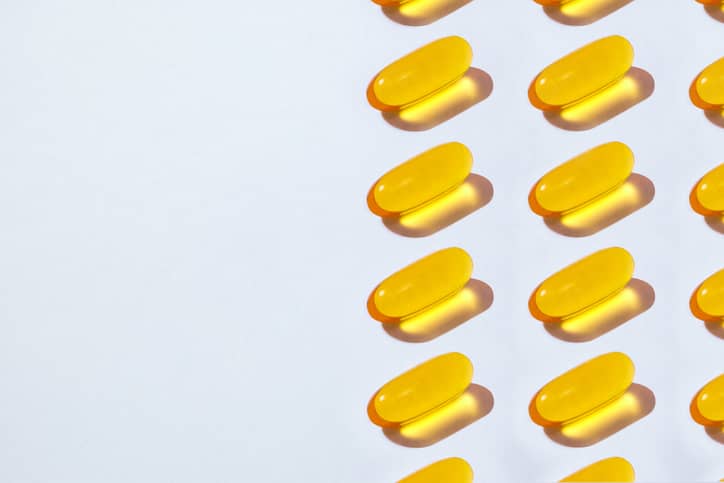If you’re going through the menopause, chances are you’re noticing changes in your body – and this can be challenging to deal with.
As your levels of a hormone called oestrogen decline, menopause symptoms such as hot flushes, night sweats, trouble sleeping and low mood can have an impact on your daily life. So it’s understandable if you’re looking for things to make you feel better.
But while there are various supplements to help with menopause available, do they actually work?
In many cases, there’s a lack of scientific evidence about the safety and effectiveness of menopause supplements and more research is needed. There are, however, certain nutrients that are important during the menopause, and supplements may sometimes be helpful.
Read on to discover the best menopause supplements for you – and the ones it’s probably best to avoid.
Calcium
Calcium is a mineral that’s needed for bone health – which is particularly important during the menopause.
This is because as your oestrogen levels drop, you lose more calcium from your bones. This increases your risk of a condition called osteoporosis, which causes weak bones that are more likely to break.
The recommended daily amount of calcium varies depending on what country you live in, but it’s generally agreed that you need more after the menopause – around 1,200mg a day.
You should usually be able to get all the calcium you need from your diet – good sources include dairy products such as milk, yoghurt and cheese, foods fortified with calcium such as breakfast cereals and leafy green vegetables such as kale.
But if you’re worried that you’re not getting enough calcium from your diet – because you don’t eat dairy products, for example – a calcium supplement might be a good idea.
It’s best to get advice from your doctor about whether a calcium supplement is right for you, and how much you should take.
Too much calcium may increase your risk of other health problems and interfere with your absorption of minerals such as iron and magnesium.
Vitamin D
When it comes to vitamins for menopause, vitamin D is among the most important. That’s because it helps your body absorb calcium – which, as you now know, is needed for strong bones.
It can be difficult to get enough vitamin D from your diet as it’s only found in a small number of foods, such as oily fish and eggs.
Your body also makes vitamin D when your skin is exposed to sunlight. But the amount you get will vary, depending on where in the world you live and other factors.
In the UK, for example, the sun isn’t strong enough for your skin to make vitamin D between October and March, so it’s recommended that everyone takes a 10μg supplement during the winter.
If you cover your skin, spend a lot of time indoors or have dark skin, you have an increased risk of vitamin D deficiency. You may want to consider taking a supplement all year round.
If you're concerned about your vitamin D levels and you want to take a supplement, it’s best to discuss it with your doctor first.
It’s rare for vitamin D supplements to cause side effects, but very high doses – more than 100μg a day for long periods – can be toxic. High doses should only be taken if advised by a doctor. They may also be unsuitable if you’re taking other medication or have certain health conditions.

Omega-3s
Weight gain is another common side effect of the menopause – again, it’s due in part to dropping oestrogen levels. And being overweight can increase your risk of various health problems, including heart (cardiovascular) disease.
Research has shown that a group of ‘healthy’ unsaturated fats called omega-3s can help to keep your heart healthy. They also play a role in bone health and have been shown to improve mood, so it’s a good idea to include them in your menopause diet.
The best source of omega-3 is oily fish, such as sardines, salmon and mackerel, and it’s often recommended that you eat oily fish once or twice a week. (Bonus: oily fish provide vitamin D, too.) But if you don’t eat fish, you might want to consider a supplement.
Omega-3s are also found in nuts and seeds, vegetable oils, soya products, and green leafy vegetables. They are added to some varieties of other foods, too, such as eggs, milk, yoghurt, bread and spreads.
There aren’t any official guidelines about omega-3 supplements, so it’s probably best to talk to a dietician or doctor for advice. And watch out for omega-3 supplements that are very high in vitamin A, as large amounts may be bad for your bone health.

Plant oestrogens (phytoestrogens)
Plant oestrogens are substances that are similar to the hormone oestrogen, which your body stops making during the menopause.
They’re found in foods such as linseeds and soya products such as tofu, and if you eat them regularly they may start to have some of the same effects as oestrogen. Some people find that this can help with menopause symptoms, such as hot flushes.
Supplements are also available, and there’s some evidence that supplements containing certain plant oestrogens called isoflavones may help reduce hot flushes and some other menopause symptoms.
However, it’s important to bear in mind that more research is needed. The quality, safety and effectiveness of plant oestrogen supplements can vary, and is often unproven. Also, it’s worth knowing that they can cause adverse effects, interact with other medication and should not be used with certain medical conditions (such as some breast cancers).
Alternative treatments
‘Bioidentical’ or ‘natural’ hormones are hormones that are chemically the same as the hormones your body makes. They’re extracted from plants or animals, rather than being made in a lab. They aren’t generally recommended for symptoms of the menopause, however, as it’s unclear how safe or effective they are.
Some menopause supplements contain a herb called black cohosh, as some studies show it may help with symptoms such as hot flushes. But the research isn’t conclusive about either its effectiveness or safety, and it may even cause liver damage and other side effects.
If you’re thinking about trying any alternative treatments or herbal remedies for the menopause, speak to your doctor or a pharmacist for advice.
Testosterone
As well as losing oestrogen when you go through the menopause, your levels of the sex hormone testosterone also drop by about 50%. This means reduced sex drive (libido) is a common menopause symptom.
If you have reduced sex drive, your doctor may recommend hormone replacement therapy (HRT), where you take oestrogen to replace what you’ve lost. But if this doesn’t help, a testosterone supplement might be an option.
However, it’s important to note that the safety and effectiveness of testosterone supplements for menopause are unproven. There are possible side effects too including acne and unwanted hair growth.
You should talk to your doctor before taking any supplements, to check they’re suitable for you. If your symptoms get worse or you get any side effects, stop taking the supplement and get medical advice.
Key points
- various supplements claim to help with menopause symptoms
- many menopause supplements need more research to prove their effectiveness and safety
- you can get most important nutrients during menopause from your diet
- calcium and vitamin D are important for bone health, and in some cases a supplement may be suitable
- you should talk to your doctor before trying any menopause supplements


